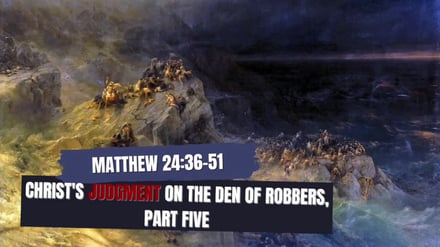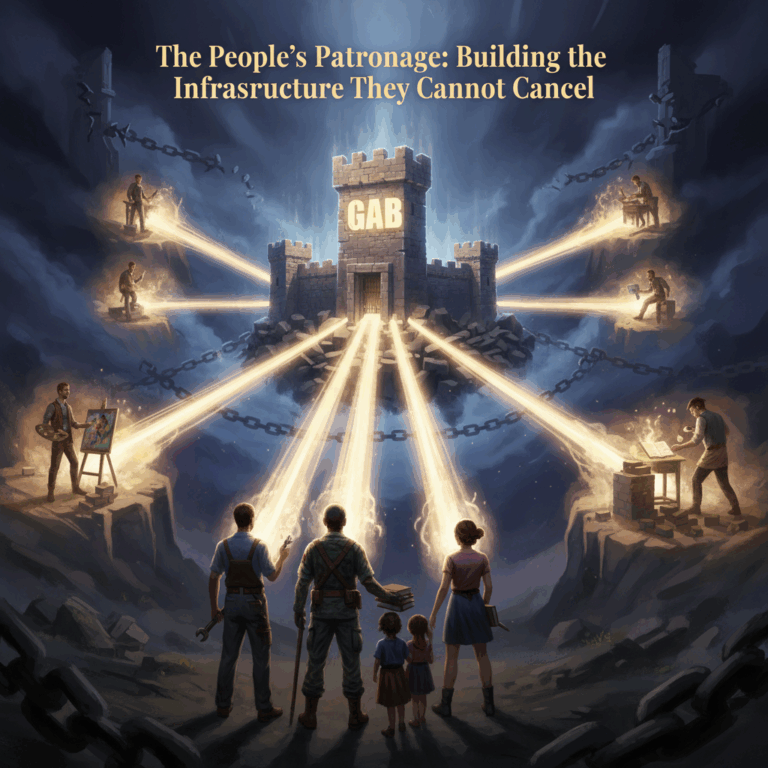Click here for Part 1
Click here for Part 2
Click here for Part 3
Click here for Part 4
Click here for the sermon that accompanies this post
36 “But of that day and hour no one knows, not even the angels of heaven, but My Father only. 37 But as the days of Noah were, so also will the coming of the Son of Man be. 38 For as in the days before the flood, they were eating and drinking, marrying and giving in marriage, until the day that Noah entered the ark, 39 and did not know until the flood came and took them all away, so also will the coming of the Son of Man be. 40 Then two men will be in the field: one will be taken and the other left. 41 Two women will be grinding at the mill: one will be taken and the other left. 42 Watch therefore, for you do not know what hour your Lord is coming. 43 But know this, that if the master of the house had known what hour the thief would come, he would have watched and not allowed his house to be broken into. 44 Therefore you also be ready, for the Son of Man is coming at an hour you do not expect.
45 “Who then is a faithful and wise servant, whom his master made ruler over his household, to give them food in due season? 46 Blessed is that servant whom his master, when he comes, will find so doing. 47 Assuredly, I say to you that he will make him ruler over all his goods. 48 But if that evil servant says in his heart, ‘My master is delaying his coming,’ 49 and begins to beat his fellow servants, and to eat and drink with the drunkards, 50 the master of that servant will come on a day when he is not looking for him and at an hour that he is not aware of, 51 and will cut him in two and appoint him his portion with the hypocrites. There shall be weeping and gnashing of teeth.
Matthew 24:36-51
Introduction
Being “left behind” is sometimes a bad thing and sometimes a good thing. If you are a child on a long road trip with your family and you stop at a rest area, and you are left behind that, of course, is a very bad thing. If you are on the elementary school playground and they are picking teams, being left behind is a very bad thing. If you are living in a coastal village in Europe any time from the fall of Rome right up until the modern age, and Norse or Arab raiders come to enslave you (as happened regularly) you very much do want to be left behind. What matters is who is doing the taking and leaving in this scenario. In our passage today, Jesus talks about people being taken and left behind. Obviously, many people read these passages through the lens of the Scofield Reference Bible and rapture pop-fiction, but the Bible does not want us to read it through the lens of 19th and 20th Century novelties, it wants to be read in its own context. The founder of Voice of the Martyrs, Richard Wurmbrand, had a passage in his book, Tortured For Christ, where he talked about teaching the Bible to Communists inside the Iron Curtain. When he would try to explain certain parables like the Good Shepherd, they could not understand what he was talking about. They would say things like “why does this guy have all those sheep? Those belong to the state, he is a criminal who is hoarding them for himself.” They did not understand because they had no idea what the context was. They were reading the story as if Jesus was living in the 20th Century Soviet Union. This might be comical to us to look at them from the outside, but as 21st Century Americans, we often do the same thing. We read these gospels as if these people are just like us, living in a world just like ours, with a history and a culture just like ours. That is a major mistake. We need to read the New Testament like we are aliens from another planet who have crash-landed in First Century Israel. Their culture and history and way of life are totally alien to us and we must first understand that rather than assuming they are operating in our context. Our passage today is a prime example.
A New Flood and A New Exile (v. 36-44)
Jesus continues in the Olivet Discourse, explaining to His disciples how the Old Covenant is going to come to a chaotic and violent end, that a world that had existed from the day Noah stepped out of the ark now was going to be destroyed and remade. So it makes perfect sense that the first thing in Israel’s history Jesus would compare it to is the flood of Noah. He says this period (of what ended up being 40 years) will be just like the days of Noah. For those under judgment, life just kept going like normal.
Remember, there are just 12 men hearing this Olivet Discourse. One of them, the Apostle Peter, would later write a letter to the church near the end of this 40 years, which was entirely about why the judgment Jesus said was coming in this generation had not happened yet. In Peter’s second epistle, in the second chapter, as He is making the argument that God is not procrastinating, but waiting until the precise right moment to render judgment, that “Noah was a preacher of righteousness” to that world that existed before the flood. For all that time as he awaited the flood waters to come, and labored in building the ark, he was also preaching the righteousness of God to horribly wicked people. They should have listened to Noah. But they refused. In the same way, Israel should listen to the apostles, but they will continue as they have been, eating and drinking, marrying and giving in marriage, right up until judgment comes. And when that judgment came, their world was destroyed completely.
We don’t instantly recognize the comparison to Noah’s flood, since Noah’s flood was global. It literally destroyed the entire world. We don’t understand this comparison because we don’t recognize the thing that upheld the entire ancient world, the thing that keep the entire Old Covenant world chugging along, both pagan and believing, was the worship of Yahweh at His temple. The temple was the pillar that upheld the whole ancient world. God chopping this down is just as big a deal as Him flooding the entire world. One world is ending and a new one is being created.
The other comparison to Israel’s history that Jesus makes is less explicit. Even in a 21st Century America that has had biblical illiteracy imposed upon it, most people are familiar with Noah and the flood. Very few, however, are familiar with Israel’s history between the kings like David and Solomon and the time of Jesus. This is why it is so easy for end times snake oil salesmen to sell lots of books and get rich off the despair of God’s people. We don’t know the Bible well enough to ask the right questions. Was there anything in Israel’s history, a judgment like the flood of Noah, where some were taken and others left? When Babylon conquered Jerusalem, destroyed the first temple, and took the people into captivity. Taking one man and leaving another is a description of being carried away into exile. In this instance, you want to be left behind. Jesus is making an allusion to what the Babylonians did to Israel because the Romans are going to do the same thing. An army like a flood is coming that will destroy everything in its path.
Because of this, Jesus tells them you don’t know precisely when I am coming upon you in judgment any more than Israel knew I was coming in judgment with the Babylonians. I am coming, that is certain. If I told you the precise hour, you would not do the things that are necessary. You would not go and evangelize the whole Roman world. You would hang out in Jerusalem, cozy and comfy, right until the late 60s AD. A thief doesn’t call you up and schedule a time to rob you. You have to set up your Ring cameras all over your house, deadbolt your doors, have a bunch of big dogs and guns ready for them. Basically, as it pertains the judgment that is coming upon the Old Covenant, Jesus is telling the Apostles to be like Kevin from Home Alone. Be ready.
Parable of the Faithful and Unfaithful Slaves (v. 45-51)
From here, Jesus tells the apostles the first of three parables that pertain to everything that He just told them. In this parable, there are two slaves, one is a faithful servant, whom his master left in charge of the household. This slave did his job like the master is going to return, and when the master returned, because the slave proved his trustworthiness, he made him in charge of everything. But the unfaithful slave doesn’t believe the master is going to return, or at least not very soon, so he mismanages his master’s household and beats the other slaves he is left in charge of. When the master comes, he’s going to cut him in half and throw him in a place where there is weeping and gnashing of teeth.
The first slave is a slave like Joseph. Though he has been reduced to slavery, Joseph was faithful in his tasks and as a result was given more and more responsibility and rule, to the point that he was the de facto ruler of the world. The second slave does not really believe his master will be returning. He squanders the things he has been left in charge of. And when the master returns there will be furious judgment against that man. He will literally be cut in half and thrown into hell.
Who is Jesus talking about here? He’s talking to and about the apostles. He is telling them not to think that if it hasn’t happened yet that it is not going to happen. The reason the second slave behaved the way he did is because he did not trust his master to return. Every day the master did not come back was another day it seemed less likely that he was ever going to return. Jesus says to His apostles not to count the days this way. Treat His return in judgment as a certainty and you will not end up like the unfaithful slave.
Conclusion
As we have gone through the things Jesus has said to His disciples on the Mount of Olives, it should be clear that He is telling them about imminent judgment on the Old Covenant. Often people then think, well, if this is about something that happened nearly 2,000 years ago, what relevance does it have to my own life? It is an important question, and the answer is: it is incredibly relevant to your own life today. The pattern for how God acts in history is laid out for us.
Throughout the Olivet Discourse, Jesus is making reference to Israel’s history and how God would put up with wickedness for a very long time before bringing the hammer down. This is how Jesus establishes for them what was going to happen in 70 AD. Here’s the pattern for how God has acted in the past and God is going to follow it to a T, here.
That pattern has not changed in the thousands of years of church history, either. If you were a Roman Christian in 410 AD watching Rome get sacked by barbarian hordes, you might think the world is ending. Civilization is coming to an end. All is lost. Jesus will certainly return now. Many Christians believed this. And it would be easy to conclude this. But at the exact same time this was happening, one of the greatest minds of the early church, Saint Augustine, was writing a book called City of God which would provide the theological and philosophical framework for the Christianization of Europe for the next thousand years. The world was ending, but God was building a new one that was more glorious than what came before.
The judgment that had been built up over generations was finally coming down upon Rome, it was falling apart at the seams, but God was doing something in and through it. You were born into similar times. The things that you took for granted in your youth, a country that not only never experienced hunger, but its greatest threat to public health has been the consumption of too much food, and this is especially true of those who are the poorest in our society. If you told such a thing to people living throughout all of human history they would assume you live in a utopia like in Star Trek. Generations who have never known material hardship, hunger, and famine are now going to be introduced to it. The opportunity for prosperity that existed throughout our lifetimes is disappearing. The mentality of the independent, industrious free man (the harder you work, the better your life will be) is being replaced with that of the serf and slave: the harder you work only means more is going to be taken from you. Things are becoming hard. And they are probably going to be even harder for our children. The people who sell lots of end-times books see this situation and want you to despair. All is lost. There is no hope. Jesus, however, does not want you to despair. He wants you to have hope and to persevere and to fight.
For generations, we have lived in a nation that was handed an inheritance from forefathers who mostly believed God and lived under His authority. This does not mean we had a Christian utopia, but rather a society where even the unbelieving understood God’s standards for right and wrong and mostly lived accordingly. But for generations now we have increasingly spurned God and His Word. Our nation holds its middle finger to the heavens, daring God to strike it. Millions of babies murdered, total sexual chaos, nearly entire generations of children sexually abused, all manner of sexual perversion imposed upon us and now upon our children, a nation with blasphemy and hatred of God at the center of our culture. The question Christians would ask toward the end of the 60s AD is one we are tempted to ask? How long O Lord? How long will You put up with this? When will you act?
It seems like God is beginning to act. And we should conclude that this is good. And we should therefore continue to build things that will withstand this flood that is coming upon us. Christ’s church is the ark of salvation. As the waters begin to rise we should prepare for many people to come knocking on the door. Unlike Noah’s ark, this door will open to them. The harvest is becoming even more plentiful by the day. God is graciously revealing the desperate need our people have for Him by the day. Pray that the gospel would deliver many to salvation in Christ. That is what God has called us to in our generation. To be preachers of righteousness in our generation. So go, and welcome men into the Kingdom of Jesus Christ. In the name of the Father, the Son, and the Holy Spirit. Amen!





